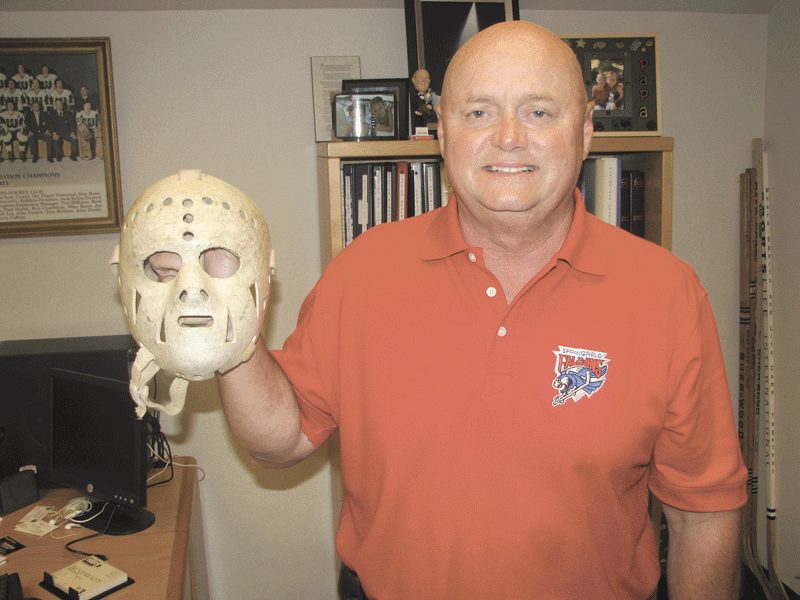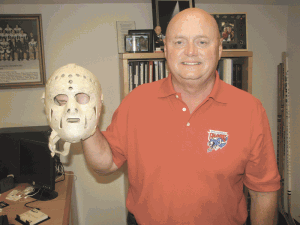
Profiles in Business
This Hockey Veteran is Certainly Goal-oriented
Bruce Landon said an equipment manager found it a few months ago in an old equipment bag in the back of a storage area at the Springfield Falcons complex within the MassMutual Center.Now, the goalie mask, which Landon last used in action in the mid ’70s when he played for the World Hockey Associations’s Hartford Whalers, is displayed on a book shelf in his office, not far from the so-called “stick pad,” found in the same box, that he also used during a career cut short by a knee injury.
“I tried it on … it was pretty tight; the eye holes didn’t line up just right,” Landon said of the mask. “I’ve put on some weight over the years, obviously. I’ve got to lose about 15 pounds for that to fit again.”
The goalie equipment, which certainly looks dated when compared to the high-tech gear goalies use today, is one of the few items that have survived from Landon’s playing days. Other items in his office include a souvenir Whalers coffee mug, bearing his picture, that was sent to him by a fan of that team, as well as a framed team picture of the 1972 Whalers squad that captured the WHA championship.
“That club would have beaten most NHL teams,” said Landon as he ticked off the names of former teammates on that unit, many of whom enjoyed success in the NHL before or after that 1972 season. “That was a talented group of players.”
One has to prod the Kingston, Ontario native to talk about his playing days and the past in general. The man most closely associated with hockey in Springfield for the past three decades is certainly more focused on the present and especially the future, one that he says is dominated by question marks, much more so than he would prefer.
Indeed, while he would like to say that there will always be hockey in Springfield, he knows he can’t really use that phrase with any degree of confidence.
“I always like to remain optimistic that we can put something together and remain here long-term, but there are simply no guarantees anymore,” he said, noting that the hockey landscape has changed considerably over the past three decades and especially the past several years, and the challenges to existence, especially in what is now considered a small market, are mounting.
After several years of deep disappointment — the team hasn’t made the playoffs since 2003 and it’s been 20 years since the last Calder Cup championship — with NHL affiliates the Edmonton Oilers, Tampa Bay Lightning, and Phoenix Coyotes, the Falcons have a new partner in the Columbus Blue Jackets. The deal is just for one year (with an option year) though, as both the Falcons and the new parent club essentially try on this relationship to see how it fits.
But hockey in Springfield has become what amounts to a year-to-year proposition anyway, said Landon, 61, who told BusinessWest that attendance, down slightly from years ago, must improve if the team is going to compete, and succeed financially, at a time when expenses continue to soar, as does competition for the time and attention of area families.
For this, the latest installment of its Profiles in Business series, BusinessWest talks at length with a man who has gone from preventing goals on the ice to meeting and exceeding them in the changing world of professional hockey.
Making the Big Stop
Landon likes to joke that he put Billy Smith in the hall of fame.
The two were teammates and fellow netminders on the 1969-70 Springfield Kings squad that played its home games in the Coliseum at the Big E. Landon was injured (a shoulder dislocation) during the final weeks of that season, putting Smith between the pipes for a playoff run that ended in a memorable Calder Cup championship.
Smith would use that run to help catapult his way into the NHL, first with the Los Angeles Kings, and later the expansion New York Islanders, for which he played a lead role in four consecutive Stanley Cup championships in the early ’80s.
“I always told Billy that if I never got hurt, he wouldn’t have got a chance to play,” said Landon, whose hockey career, cut short by injuries, took a much different, but nonetheless fulfilling, route.
After playing with the Whalers for five seasons, he found himself back in the AHL, and Springfield, where he both played and handled some sales the summer before the season started, an unusual arrangement, orchestrated by Springfield Indians owner George Leary that gave Landon a taste of life in the front office. When Landon blew out his knee in December, 1977, Leary offered him a job handling group sales.
“And I’ve been here ever since.”
He’s had just about every title one can have with such an organization, from director of marketing and public relations to the current president and general manager, with ‘co-owner’ “thrown in,” as he likes to say, in 1994, when, just a few weeks after the then-Springfield Indians left the city for Worcester, he cobbled together an ownership group that brought a new team, to be called the Falcons, to town.
Since that time, Landon’s unofficial job description has been to keep hockey in Springfield, where it has been part of the landscape since 1936. He’s been successful in that mission due to his ability to recruit, assemble, and maintain two ownership groups, the second in 2002, that have enabled the city’s hockey tradition to continue.
In recent years, the team has managed to survive, but wins, not to mention playoff opportunities, have been hard to come by. The Falcons have gone through a number of NHL affiliations — more than most teams, by Landon’s calculations — and that certainly hasn’t helped matters. And the team’s presence at or near the bottom of the standings had definitely impacted attendance.
All this makes the task of keeping hockey in Springfield that much more challenging, said Landon, who brings vast amounts of energy, determination, and imagination to that assignment.
“I’m still the first one in in the morning and the last one to go home at night,” he said, while describing himself as a workaholic, and one who didn’t take a full week’s vacation at one time (until just last month) for perhaps two decades. “I love what I do; if I didn’t enjoy, I wouldn’t be doing it after all these years.”
Icing on the Cake
Landon said this work ethic reflects his hiring strategies as well as his management style. In short, when he’s evaluating the large amounts of young talent coming out of sports management programs, including those at several area colleges, he’s looking for certain traits, especially hard work and the ability to sell.
“The first thing I look for when I hire someone is a passion for the industry,” he explained. If you don’t have that passion for business or the passion to come to work every day, I don’t want you. As the guy overseeing this operation, I don’t want to micromanage and I don’t want to baby-sit. I want people who come in the morning excited to be here, knowing there’s a wonderful opportunity to build their resume.”
Looking back on his own career in hockey, Landon said he had a few attractive opportunities to move on to the NHL. But he ultimately turned them down to keep his family — and himself — grounded in Western Mass.
“I didn’t want to be a hockey gypsy,” he explained, noting that in this business, many assignments are only a few years in duration, and families must be uprooted with each new career stop. “I had a couple of opportunities over the years, going way back. When I was a player, I built a house in West Springfield and raised by two kids in West Springfield.
“Family is important to me, and it was important for me to establish roots here — I love this region,” he continued. “I never had any aspirations to be a coach … I always loved the management side, the sales side, the marketing side. I looked at my options, and said, ‘I like what I have going for me. If hockey doesn’t work out for me, I’ll find something else to do here. But hockey has always worked out.”
Looking ahead, Landon said his broad goal, however difficult it may be to achieve, is to add a layer, or perhaps several layers, of permanence to the prospects for hockey in Springfield. He told BusinessWest that this work will likely involve recruitment of more or different owners, as the current mix has been in place for more than eight years, and some may be ready for new and different opportunities.
“Our group of owners has been fantastic, we have tremendous partners here,” he said. “But it’s been eight years for them now, so maybe it’s time for a changing of the guard, and I’m hoping we can find some committed people at the local level. There’s a lot of interest in this franchise from groups outside this area, but with those people, you don’t have that local commitment.”
And for both current owners, as well as those in the future, hockey in Springfield must be more of a philanthropic gesture than a pure business decision, he continued.
“You can make money at this and we have in the past,” he said with a smile that indicated that such a feat is getting more difficult all the time. “But if people are looking at this as a pure investment, then they should put their money somewhere else; there has to be a little bit of philanthropic investment here as well, where it’s good for the community, it’s good for the city. Hockey has been here since 1936 and it’s a major part of this city.”
Net Results
Assessing the present and future status of hockey in the City of Homes, Landon said his management teams have, over the years, done a good job of providing solid family entertainment at the arena on Main Street. There was then a pause, followed by the inevitable ‘but …’
“We need a better product on ice to get the hockey fan back, to make hockey viable here.”
Making hockey viable in Springfield has been Landon’s passion since, well, the last time he put on a uniform and that old goalie mask that no longer fits him properly.
He knows there’s no turning back the clock — with regard to where the eye holes should line up on his face, or with the game of hockey as a business; the game has changed, and there’s no going back to the old days.
But then again, he’s never been one to dwell on the past.
George O’Brien can be reached at [email protected]







